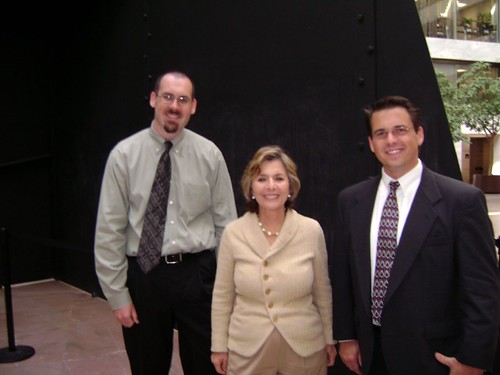 Check out how slumped over I am in this photo. Note to self: next time straiten up a bit... the back AND the tie. Sheesh!
Check out how slumped over I am in this photo. Note to self: next time straiten up a bit... the back AND the tie. Sheesh!So what were the meetings like? They varied considerably. From a 5 minute hallway chat to a leisurely discussion on comfy chairs to a conversation in a coffee shop (yes, that was with a staffer from Washington State), the venue changed. The message was the same. My pitch went something like this:
Hello, I'm Thomas Robey and am Washington State's newest bioengineering PhD. While I was a graduate student I was supported by two different NIH research grants, and as a medical student in the NIH funded MD/PhD program am the beneficiary of another. For the last four years I have been working on a project to restore cardiac function after heart attacks using human embryonic stem cells. I used one of the lines approved for federal funding. What is really exciting is that the team I am a part of has been able to grow human heart tissue in mice and rats that have heart attacks. This has helped the injured rodent hearts pump better, too. Unfortunately, we only have access to a very small number of cell lines - smaller even than the 12 or so that are readily available. It turns out that the lines made before August 9 are not the best to do research with. We are looking forward to a policy change about stem cells! Now that I have finished my PhD, I will be looking to a future when fewer young scientists are able to secure funding. It is important for the NIH funding lines to at least keep up with inflation. (We would like to see the bill in conference to accept the Senate's numbers.) The funding trajectory for the NSF should also be maintained to eventually double its allocations. It is important to understand that the money spent on both basic and applied research pays back into the economy several fold. Thank you for your past support for science, and I am happy to be a resource to you or other staffers should you need information about stem cell or medical science issues.That's about it. Somewhere in there would be the obligatory transfer of business cards, and maybe the staffer would ask a few questions, but 15 minutes later I was on my way. If these meetings were the point of the trip, those would be some pretty expensive minutes. Fortunately, the real value was in training young scientists to speak with congressional staff and creating potentially lasting relationships between scientists and policy-makers. I will touch on that more in a future post, but for now, I need to submit my travel expenses - oh yeah, you can apply for travel awards from the JSCPP...
*I think it's fair in science to categorize 29 as young!





No comments:
Post a Comment